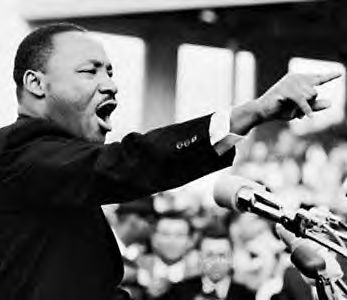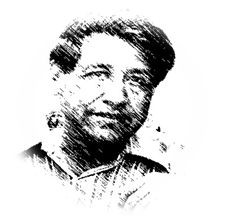
|
||||||||||||||||
Click image for bio
 (from Wikipedia)
Martin Luther King, Jr. (January 15, 1929 – April 4, 1968) was an American clergyman, activist, and prominent leader in the African American civil rights movement. He is best known for being an iconic figure in the advancement of civil rights in the United States and around the world, using nonviolent methods following the teachings of Mahatma Gandhi. King is often presented as a heroic leader in the history of modern American liberalism.
(from Wikipedia)
Martin Luther King, Jr. (January 15, 1929 – April 4, 1968) was an American clergyman, activist, and prominent leader in the African American civil rights movement. He is best known for being an iconic figure in the advancement of civil rights in the United States and around the world, using nonviolent methods following the teachings of Mahatma Gandhi. King is often presented as a heroic leader in the history of modern American liberalism.
A Baptist minister, King became a civil rights activist early in his career. He led the 1955 Montgomery Bus Boycott and helped found the Southern Christian Leadership Conference in 1957, serving as its first president. King's efforts led to the 1963 March on Washington, where King delivered his "I Have a Dream" speech. There, he expanded American values to include the vision of a color blind society, and established his reputation as one of the greatest orators in American history.
In 1964, King became the youngest person to receive the Nobel Peace Prize for his work to end racial segregation and racial discrimination through civil disobedience and other nonviolent means. By the time of his death in 1968, he had refocused his efforts on ending poverty and stopping the Vietnam War.
King was assassinated on April 4, 1968, in Memphis, Tennessee. He was posthumously awarded the Presidential Medal of Freedom in 1977 and Congressional Gold Medal in 2004; Martin Luther King, Jr. Day was established as a U.S. national holiday in 1986.
Civil rights leader, theologian, and educator Howard Thurman was an early influence on King. A classmate of King's father at Morehouse College, Thurman mentored the young King and his friends. Thurman's missionary work had taken him abroad where he had met and conferred with Mahatma Gandhi. When he was a student at Boston University, King often visited Thurman, who was the dean of Marsh Chapel. Walter Fluker, who has studied Thurman's writings, has stated, "I don't believe you'd get a Martin Luther King, Jr. without a Howard Thurman".
With assistance from the Quaker group the American Friends Service Committee and inspired by Gandhi's success with non-violent activism, King visited Gandhi's birthplace in India in 1959. The trip to India affected King in a profound way, deepening his understanding of non-violent resistance and his commitment to America's struggle for civil rights. In a radio address made during his final evening in India, King reflected, "Since being in India, I am more convinced than ever before that the method of nonviolent resistance is the most potent weapon available to oppressed people in their struggle for justice and human dignity. In a real sense, Mahatma Gandhi embodied in his life certain universal principles that are inherent in the moral structure of the universe, and these principles are as inescapable as the law of gravitation." African American civil rights activist Bayard Rustin had studied Gandhi's teachings. Rustin counseled King to dedicate himself to the principles of non-violence, served as King's main advisor and mentor throughout his early activism, and was the main organizer of the 1963 March on Washington. Rustin's open homosexuality, support of democratic socialism, and his former ties to the Communist Party USA caused many white and African-American leaders to demand King distance himself from Rustin.
Links:
- The King Center
- Martin Luther King Jr | Quotes, Pictures, Speech, Facts, Biography & More..
- "Martin Luther King Jr. Collection"
- Photo Essay: "The Last Days of Martin Luther King, Jr."
- The Martin Luther King, Jr. Papers Project
- MLK online
- Martin Luther King Jr., "A New Sense of Direction (1968)"
- Martin Luther King, Jr. at Find a Grave
- "Martin Luther King Jr.", The Seattle Times
- Speeches of Martin Luther King
